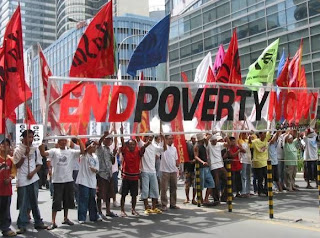 Poverty in the developing world, however, goes far beyond income poverty. It means having to walk more than one mile everyday simply to collect water and firewood; it means suffering diseases that were eradicated from rich countries decades ago.
Poverty in the developing world, however, goes far beyond income poverty. It means having to walk more than one mile everyday simply to collect water and firewood; it means suffering diseases that were eradicated from rich countries decades ago.
Every year eleven million children die—most under the age of five and more than six million from completely preventable causes like malaria, diarrhea and pneumonia.
In some deeply impoverished nations less than half of the children are in primary school and under 20 percent go to secondary school. Around the world, a total of 114 million children do not get even a basic education and 584 million women are illiterate.
here are the facts in detail:
■ Every year six million children die from malnutrition before their fifth birthday.
■ More than 50 percent of Africans suffer from water-related diseases such as cholera and infant diarrhea.
■ Everyday HIV/AIDS kills 6,000 people and another 8,200 people are infected with this deadly virus.
■ Every 30 seconds an African child dies of malaria—more than one million child deaths a year.
■ Each year, approximately 300 to 500 million people are infected with malaria. Approximately three
million people die as a result.
■ TB is the leading AIDS-related killer and in some parts of Africa, 75 percent of people with HIV also have TB.
*(TB= tuberculosis)
■ More than 800 million people go to bed hungry every day...300 million are children.
■ Of these 300 million children, only eight percent are victims of famine or other emergency situations.
More than 90 percent are suffering long-term malnourishment and micronutrient deficiency.
■ Every 3.6 seconds another person dies of starvation and the large majority are children under the age of 5.
■ More than 2.6 billion people—over 40 per cent of the world’s population—do not have basic sanitation,
and more than one billion people still use unsafe sources of drinking water.
■ Four out of every ten people in the world don’t have access even to a simple latrine.
■ Five million people, mostly children, die each year from water-borne diseases.
■ In 1960, Africa was a net exporter of food; today the continent imports one-third of its grain.
■ More than 40 percent of Africans do not even have the ability to obtain sufficient food on a day-today
basis.
■ Declining soil fertility, land degradation, and the AIDS pandemic have led to a 23 percent decrease
in food production per capita in the last 25 years even though population has increased dramatically.
■ For the African farmer, conventional fertilizers cost two to six times more than the world market price.
■ Above 80 percent of farmers in Africa are women.
■ More than 40 percent of women in Africa do not have access to basic education.
■ If a girl is educated for six years or more, as an adult her prenatal care, postnatal care and childbirth
survival rates, will dramatically and consistently improve.
■ Educated mothers immunize their children 50 percent more often than mothers who are not educated.
■ AIDS spreads twice as quickly among uneducated girls than among girls that have even some schooling.
■ The children of a woman with five years of primary school education have a survival rate 40 percent
higher than children of women with no education.
■ A woman living in sub-Saharan Africa has a 1 in 16 chance of dying in pregnancy or childbirth.
This compares with a 1 in 3,700 risk for a woman from North America.
■ Every minute, a woman somewhere dies in pregnancy or childbirth. This adds up to 1,400 women
dying each day—an estimated 529,000 each year—from pregnancy-related causes.
■ Almost half of births in developing countries take place without the help of a skilled birth attendant.
- www.unmillenniumproject.org
© The poets voice~~~ October 2008, All rights reserved.















